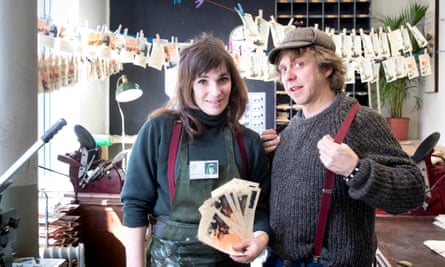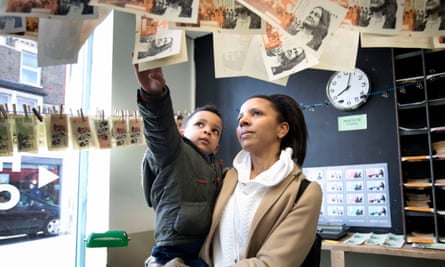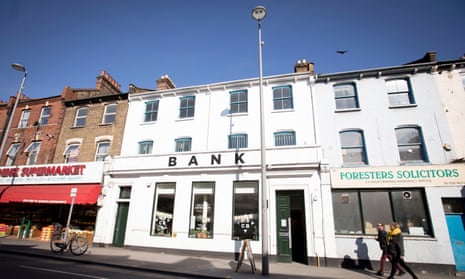First there were the banks. Sending credit cards through the post, offering easy loans. They overstretched, teetered. Then came the billion-dollar bailouts, recession, austerity, poverty and payday loans.
Then, slowly, came the movement: a piecemeal, sporadic effort to buy back the debt of ordinary people.
Now in north-east London, an enterprise that is part art installation, part stunt and part charitable endeavour, has brought all the threads together: a bank that prints its own money, sells it for real tender and uses the proceeds to buy back the debt.
Quick GuideWhat is the Upside?
Show
Ever wondered why you feel so gloomy about the world - even at a time when humanity has never been this healthy and prosperous? Could it be because news is almost always grim, focusing on confrontation, disaster, antagonism and blame?
This series is an antidote, an attempt to show that there is plenty of hope, as our journalists scour the planet looking for pioneers, trailblazers, best practice, unsung heroes, ideas that work, ideas that might and innovations whose time might have come.
Readers can recommend other projects, people and progress that we should report on by contacting us at theupside@theguardian.com
Hilary Powell and Dan Edelstyn have taken over an old Co-op bank on a high street in Walthamstow and are printing money featuring the faces of people behind four local services – a primary school, a foodbank, a youth project and a soup kitchen.
As well as raising money for those projects, Hoe Street Central Bank aims to raise enough money to buy out £1m of debt owned by people within the E17 postcode, in a London borough ranked 35th most deprived in the country.
“We see it as a community heist taking on the economic discourse,” says Powell.

One of the delightful ironies of the undertaking is that the ‘bank’ could only have to raise as little as £20,000 to buy out £1m of local debt, because bad loans are often written down to a fraction of their face value in the secondary market.
“The system forces people into debt for basic needs,” says Powell. “We are the forerunners of what we hope will be a bigger movement for debt abolition.”
As the bank did its unusual trade this week, schoolchildren were invited in to watch a batch of £5, £10 and £20 notes, all designed by artists, roll off the presses. After all, it’s not every day that you see your headteacher’s face on a fiver.
Bank notes featuring Tracy Griffiths were pegged onto string across the space to dry. The husband and wife creative partnership were influenced by the Strike Debt and Rolling Jubilee initiatives in the US, which started to buy debt and abolish it for ethical reasons.

In 2014, Strike Debt bought $3.8m worth of students’ loans, and spawned other ad hoc initiatives: in 2016 TV host John Oliver bought and wrote off $15m of medical debt held by 9,000 people. The Rolling Jubilee campaign has raised over $700,000 – enough to buy back over $30m debt.
One of the artists who is working as a money printer at the Walthamstow ‘bank’ (paid at the London living wage) on the project was drawn to it because he’s local and had personal experience of debt. “My parents lost their home during the recession,” says Alistair Gentry. “Anyone can get into debt. It doesn’t matter how rich you are to start with... It feels really good to roll up your sleeves and literally get inky, but also metaphorically, to do something about it. Not just sit around and having a moan.”
The bank is open until Sunday 25 March. Artists will print money in the day and there will be a series of talks in the evenings.

Edelstyn and Powell are making a film about the project, debt and the economic system called Bank Job. “Imagine if we could get it on every economics course at every university or every sixth form economics,” says Powell. “Then the reach of this goes beyond this high street to all over the country.”
The project has had the offshoot benefit of helping to strengthen community bonds as most of the people involved are local. “We live just down the road and that’s a real attraction to it,” says Edelstyn. “I used to feel like I didn’t have time to know anyone in the community. We’re all so stressed just trying to make ends meet. The idea of political engagement with groups in your community seemed like a nice idea but slightly scary and unachievable.
“But when I started to research this and get in touch with local projects, I found that everyone has a good sense of humour and they’re all normal human beings. We created this conversation across the borough, and connected different people together. That’s basically what this is. It’s just a way of talking.”
This article is part of a series on possible solutions to some of the world’s most stubborn problems. What else should we cover? Email us at theupside@theguardian.com

Comments (…)
Sign in or create your Guardian account to join the discussion